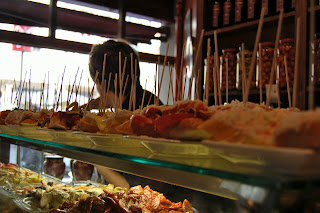


It’s the time of year in
The Plaça de Catalunya is one of the nerve centers of the city. The Mercè scene really comes alive in the evening and night, when the nocturnal Spanish festivities are in full swing. Be sure to watch your pockets and purses. The human traffic can be as bad as
Saturday brought one of the most notable exhibitions of Catalonian culture, the castells, a human castle-building exhibition dating back to the eighteenth century. The feat traditionally happens only a few times a year and is a must-see for the Mercè tourist. It involves a troupe of trained civilians climbing on top each other’s shoulders and heads to form different structures. A set of burly men making up the base and children as young as 5 years old top off the structure which can get as high as nine people.
Stay for a bit longer in the city’s barrio gótico (Gothic Quarter) and you might just get sprayed by firework-spewing devils and dragons during the correfoc (fire dance) where “devils” draped in black and red capes armed with sparkler-spewing pitchforks and firecrackers parade the streets. These demons don’t fear the gawking tourist in their way and spray anything in their path. Long-sleeved shirts and protective glasses are advised. If you fear fire consider watching from a distance.
If your night’s not over yet consider heading to the picturesque Castell de Montjüic, a castle built in 1640 on a looming hill just above the
Sunday’s celebration comes to a close with a bang above Barceloneta beach –literally. Nearly a half-hour’s worth of fireworks shoot off with the back drop of the
The Mercè celebration ends on Wednesday, when the Spanish observe a city-wide holiday so this party is far from over.








